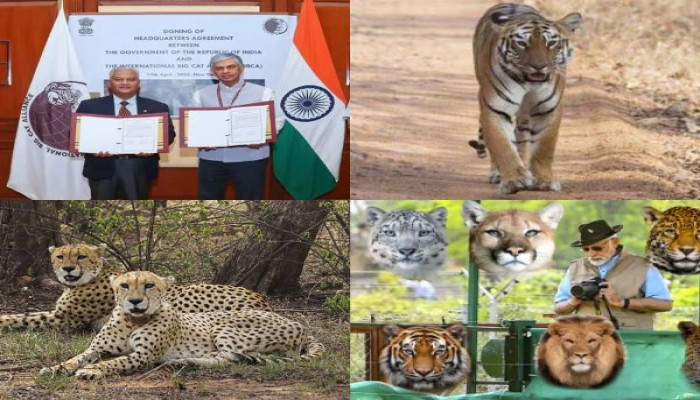India to host International Big Cat Alliance headquarters
- In Reports
- 06:51 PM, Apr 17, 2025
- Myind Staff
India has officially signed an agreement on Thursday to host the headquarters of the International Big Cat Alliance (IBCA), claiming its role as a leader in efforts to protect endangered big cat species across the world. The agreement was signed in New Delhi and plans out the structure, functioning, and operational framework for the alliance.
India Signs Headquarters Agreement with IBCA
The Ministry of External Affairs confirmed that the “Headquarters Agreement” was formally signed by P. Kumaran, Secretary (East) at the Ministry of External Affairs, and S.P. Yadav, Director General of the IBCA. This agreement establishes India's position as the permanent host for the IBCA headquarters and secretariat and New Delhi being its operational base.
Prime Minister Narendra Modi launched the IBCA on April 9, 2023, during the 50th anniversary of ‘Project Tiger’, and it officially became a treaty-based intergovernmental organisation in 2025. Its primary mission is to facilitate global cooperation in the conservation of seven major big cat species: tigers, lions, leopards, snow leopards, cheetahs, jaguars, and pumas.
Financial Backing
The agreement covers all important legal and logistical details required to allow the alliance to function efficiently. These include arrangements related to visas, privileges, immunities for IBCA staff, premises, implementation timelines, and the possibility of supplementary agreements in the future.
The Indian government has promised huge financial backing for the IBCA. According to the agreement, India will contribute ₹150 crore over five years, from 2023-24 to 2028-29. This funding will be used to build infrastructure, create a dedicated financial report, and support ongoing operational expenses. The Ministry of External Affairs stated that this shows India’s strong commitment to wildlife conservation on the global stage.
Big Cat Conservation
The IBCA’s primary objective is to protect and ensure the long-term survival of big cats through international collaboration. The organisation plans to bring together governments, conservationists, scientists, and other stakeholders to share knowledge, strengthen partnerships, and implement strategies for conserving big cats in the wild.
The alliance is designed not only to protect these species but also to bring interaction on a global level by collecting successful conservation practices. Its focus includes habitat preservation, reducing human-wildlife conflict, and creating sustainable solutions for coexistence.
According to the Ministry of External Affairs, “The initiative seeks to foster international collaboration for the sustainable future of big cats, as well as underscores India's leadership and commitment to global wildlife conservation.”







Comments